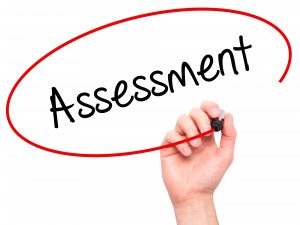In order to support the person with cognitive impairment  following Acquired Brain Injury (ABI) and to institute an appropriate rehabilitation programme it is important that:
following Acquired Brain Injury (ABI) and to institute an appropriate rehabilitation programme it is important that:
- Cognitive impairments are identified.
- Adequate assessment is carried out and interpreted accurately by professionals who have the competencies and experience to do so.
- The person with ABI, their family, carers, health professionals etc are made aware of the nature, extent and implications of these impairments.
Assessment related to cognitive functioning impairment post ABI is carried out by professionals experienced in the field of Neurorehabilitation e.g. Clinical Neuropsychologist, Clinical Psychologist, Occupational Therapist, Speech and Language Therapist and/or Neuropsychiatrist. Methods of assessment may include:
- Interviews and gathering information from the person with cognitive impairment, family, friends, carers, employers/educators and other health and social care professionals.
- Observation of the cognitively impaired person in different situations carrying out a range of daily tasks, interacting with different people.

- Checklists and monitoring forms.
- Rating scales.
- Psychometric assessments related to specific areas of cognitive function e.g. Executive Functioning, Memory, Information Processing, Attention, Language, Visual Perception and Processing. These assessments should only be carried out by the relevant professional with the correct training and skills to interpret the results.
- Cognitive screening assessments including the Addenbrooke’s Cognitive Examination- ACE III and the Montreal Cognitive Assessment (MoCA) can provide valuable information about the person’s cognitive functioning, areas of strengths and needs. They can also ‘signpost’ areas of cognitive functioning that require more in depth and specialist assessment. Please see the following websites for further information about both these assessments (and relevant training for the ACE–III):
Accurate and comprehensive cognitive assessment, appropriately interpreted and evaluated by an appropriately trained professional provides information which:
- Supports the process of rehabilitation.
- Informs the implementation of management strategies designed to help the person compensate for areas of impaired ability.
- Helps the brain injured person, their family, carers and relevant professionals understand the range of challenges which the person faces but also areas of ability upon which to build during rehabilitation.
Cognitive Assessment can also:
- Help to inform long term prognosis.
- Help to monitor ongoing progress.
- Evaluate the effectiveness of intervention programmes used in cognitive rehabilitation.
- Provide information regarding the level of support a person may need in the short and long term.
- Inform decisions regarding capacity and consent.